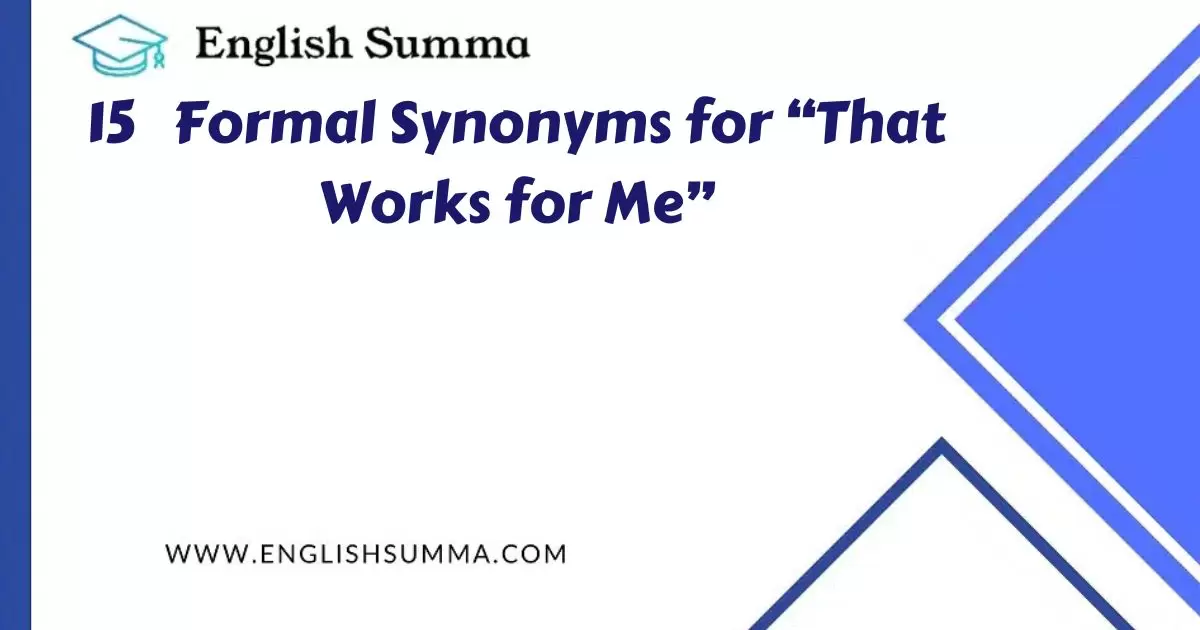When it comes to expressing agreement or approval in a formal setting, having a diverse vocabulary at your disposal can elevate your communication skills. While saying “That works for me” is perfectly acceptable, incorporating formal synonyms can add depth and sophistication to your language. In this article, we’ll explore 15 formal synonyms for this common phrase, along with scenario examples to illustrate their usage.
1. Acceptable
Scenario: Email Exchange
From: James Wilson
To: Justin Taylor
Subject: Approval for Project Proposal
Dear Justin,
I have thoroughly reviewed the project proposal you submitted. After careful consideration, I find the outlined strategies and objectives to be acceptable. Your team has demonstrated a clear understanding of the project scope and has proposed viable solutions to address the challenges outlined. I look forward to seeing this project come to fruition.
Best regards,
James Wilson
2. Suitable
Scenario: Business Meeting
James: Justin, your proposal for restructuring the marketing department seems suitable to me. It aligns well with our company’s goals and addresses the current inefficiencies.
Justin: Thank you, James. I’m glad to hear that. We can proceed with the implementation plan discussed during the meeting.
3. Satisfactory
Scenario: Performance Review Discussion
Manager: Sarah, your performance this quarter has been satisfactory. You’ve met the targets set for you and have shown improvement in areas we discussed previously.
Sarah: Thank you for the feedback. I will continue to strive for excellence in my role.
4. Agreeable
Scenario: Team Collaboration
James: Emma, your proposal for streamlining the project timeline seems agreeable to the rest of the team. We appreciate your efforts in ensuring efficiency.
Emma: Thank you, James. I believe this approach will help us meet our deadlines more effectively.
5. Appropriate
Scenario: Classroom Setting
Professor: Mark, your suggested topic for the research paper is highly appropriate. It aligns well with the course objectives and offers valuable insights into the subject matter.
Mark: I’m glad you think so, Professor. I’m eager to delve deeper into this topic.
6. Feasible
Scenario: Project Discussion
Team Lead: Rebecca, your proposal for incorporating new technology into our workflow seems feasible. It offers potential solutions to the challenges we’ve been facing.
Rebecca: Thank you for considering it. I’ll work on a detailed plan for implementation.
7. Functional
Scenario: Product Design Review
Designer: Alex, your prototype design looks functional. It meets the specifications outlined in the project brief and offers practical solutions to user needs.
Alex: I’m glad to hear that. I’ll make any necessary adjustments based on your feedback.
8. Effective
Scenario: Marketing Campaign Evaluation
Marketing Manager: Sophia, your proposed marketing strategy appears to be effective. It resonates well with our target audience and aligns with our brand image.
Sophia: Thank you for your assessment. I’ll continue to refine the campaign to maximize its impact.
9. Practical
Scenario: Budget Review Meeting
Financial Analyst: David, your cost-saving measures are practical and well-researched. They will help us stay within budget without compromising on quality.
David: I’m pleased to hear that. I’ll monitor the expenses closely to ensure adherence to the plan.
Don’t miss read out this Other Ways to Say “I Am Interested In This Position”
10. Viable
Scenario: Business Proposal Evaluation
Investor: Lisa, your business proposal seems viable. It addresses market needs and presents a clear path to profitability.
Lisa: Thank you for your consideration. I’m confident in the potential success of this venture.
11. Efficient
Scenario: Workflow Optimization Discussion
Team Member: Chris, your suggestions for optimizing our workflow are efficient. They will streamline our processes and improve overall productivity.
Chris: I’m glad you think so. Let’s implement these changes and monitor the results.
12. Operative
Scenario: Project Status Update
Project Manager: Sarah, your proposed timeline adjustments are operative. They will ensure smoother execution of tasks and timely delivery of project milestones.
Sarah: Thank you for your approval. I’ll communicate these changes to the team immediately.
13. Advantageous
Scenario: Strategic Planning Session
Executive: Tom, your strategic initiatives are highly advantageous. They position us well for future growth and competitive advantage.
Tom: I appreciate your support. I’ll continue to explore opportunities for further expansion.
14. Productive
Scenario: Team Performance Review
Supervisor: Emily, your team’s efforts have been productive. You’ve exceeded targets and consistently delivered high-quality work.
Emily: Thank you for recognizing our hard work. We will strive to maintain this level of performance.
15. Convenient
Scenario: Meeting Scheduling
Assistant: Mr. Thompson, I have found a time slot for the meeting that should be convenient for all participants. Does that work for you?
Mr. Thompson: Yes, that’s great. Thank you for arranging it.
Pros and Cons of Using Formal Synonyms
While incorporating formal synonyms for “That works for me” can enhance your communication, it’s essential to consider both the advantages and disadvantages.
Pros:
- Elevated Communication: Formal synonyms demonstrate a sophisticated command of language, enhancing professionalism.
- Precision: Different synonyms convey nuanced shades of meaning, allowing for clearer expression.
- Cultural Sensitivity: Using varied language can accommodate diverse cultural preferences and communication styles.
Cons:
- Potential Misinterpretation: In some contexts, overly formal language may be perceived as cold or insincere.
- Complexity: Using formal synonyms excessively can complicate communication, leading to misunderstandings.
- Time-consuming: Crafting elaborate expressions may require more time and effort, impacting efficiency.

